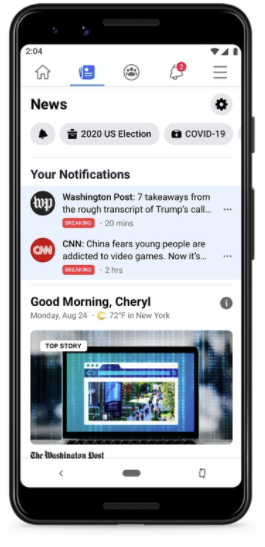Hi news publishers, it’s me, Facebook – you may remember me from my previous hits including ‘pivot to video’ and ‘prioritizing content from family and friends’.
In the latest reminder that news organizations, or publishers and brands in general, should not trust Meta to provide them with ongoing audience reach, the company is once again re-considering how it promotes news content in the app, with The Information reporting that Meta’s now looking to push news organizations towards short video, where it’s seeing the most growth in user engagement.
As per The Information:
“Meta Platforms is considering reducing the money it gives news organizations as it reevaluates the partnerships it struck over the past few years, according to people familiar with the matter. The reassessment comes as Meta looks to cut costs broadly and rethinks the value of including news in its flagship Facebook app.”
Meta has been using grants and other partnership initiatives to establish better links with news providers, in order to ensure they keep posting their content to its apps – and keep users more engaged as a result.
Meta’s most recent push on this front has been its dedicated News tab, which it’s used as an enticement to establish direct partnerships with publishers, while also sharing a percentage of revenue with these organizations.

That, in itself, has been a key point of contention, with governments in several countries pushing Meta to share more of its revenue with publishers via new ‘fair use’ policies and regulations, as a result of Meta and Google’s digital ad dominance, and its subsequent impact on local publishing markets.
The most high-profile example on this front was in Australia, where Facebook temporarily banned news publishers entirely for a period last year due to disagreement over its obligations to share revenue with these organizations.
Meta has been able to negotiate new arrangements around such policies, but a key focus of that truce has been enhanced exposure for news publishers in the app, which Meta has sought to provide via its News tab.
Now, it seems that this may change again, which could cause major headaches for news organizations around the world.
Of course, short-form video is where Meta wants to see more activity, so it makes sense to see it pushing news orgs in this direction. As part of its most recent earnings call, Meta CEO Mark Zuckerberg noted that Reels now makes up more than 20% of the time that people spend on Instagram, while video, overall, makes up 50% of the time that users spend on Facebook.
You can see, then, why Meta is moving in this direction, and with user engagement on the decline overall, it needs to start pulling all the levers that it can to keep people in its apps, instead of drifting off to TikTok instead.
In addition to this, Meta also says that fewer people have been clicking on links to news articles since President Donald Trump left office. Referral links don’t provide as much direct engagement value to Meta either way, and when you take in the overall trends, it makes sense that Meta would look to push publishers in the direction of short video instead.
It just means that publishers will now be faced with a new ‘pivot to video’. Which didn’t work out very well for them last time.
Indeed, many publishers were forced to lay-off staff in the previous video shift, which turned again once Meta stopped seeing engagement growth from video, and reduced the reach of such content via algorithm amplification.
Pivoting, once again, will trigger PTSD for many staffers, while it also serves as a reminder that Meta isn’t really looking to help publishers with its various changes, it’s looking to help itself. How you deal with that is your problem.
Of course, Meta’s running a business in an increasingly competitive space, so it needs to change strategic direction in line with the latest shifts. But again, it’s another reminder that you shouldn’t build on ‘rented land’, and that you can’t rely on Facebook or Instagram reach as a means to maximize your business.
This goes for all publishers, and all brands – you’re much better off building your own email lists and distribution channels, and using them as your core focus, than you are in relying on social media networks to amplify your content.
Definitely, social apps can provide major benefits in this respect, but they can and will change focus without warning, which could leave you in a world of pain as a result.
We’ll wait to see if Meta does, in fact, push for a new video pivot.



